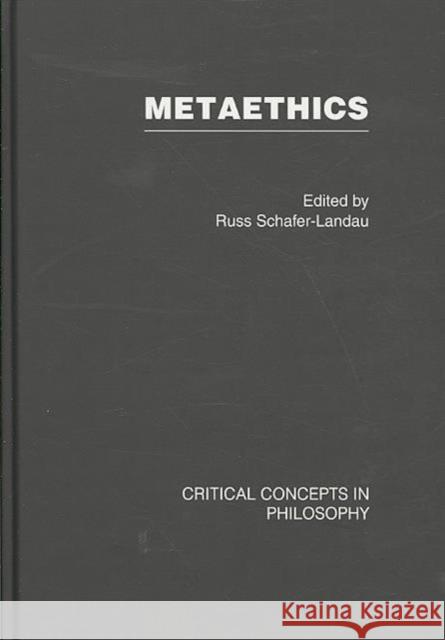Metaethics, 4-Volume Set: Critical Concepts in Philosophy » książka
Metaethics, 4-Volume Set: Critical Concepts in Philosophy
ISBN-13: 9780415439206 / Angielski / Twarda / 2008 / 1396 str.
Metaethics is the branch of knowledge that considers the foundational issues of morality, and deals especially with the nature of ethical statements. Philosophers doing metaethics ask vital and fundamental questions such as these: - is morality merely conventional, or are there objective standards of right and wrong? - how can we gain moral knowledge? - why should we be moral? - can there be a science of morality? Over the past thirty years, there has been a great surge of interest in metaethics. Almost every university offers courses in this area; new philosophical societies have formed that focus on metaethical issues; and an ever-increasing number of books and research articles attest to the growing interest in the field. Metaethics flourishes now as it has never done before and this new title in the Routledge series, Critical Concepts in Philosophy, meets the need for an authoritative reference work to make sense of the subject's vast literature and the continuing explosion in research output. Edited by Russ Shafer-Landau, a prominent scholar in the field, this new Routledge Major Work is a four-volume collection of classic and contemporary contributions that cover all of the major issues in metaethics. The first of the four volumes is dedicated to the historical antecedents of current metaethical thinking. The second volume covers the central theories within metaethics. The third and fourth volumes bring together the most important thinking on all of the key questions that are the focus of contemporary research in metaethics. Together, the four volumes provide a one-stop resource for all interested researchers, teachers, and students to gain a thorough understanding of from where this thriving subdiscipline has emerged, and where it is today. With a large, comprehensive introduction, newly written by the editor, which place the collected material in its historical and intellectual context, Metaethics is an essential work of reference and is destined to be valued by metaethicists--as well as those working in allied areas such as metaphysics, epistemology, philosophy of language, and philosophy of mind--as a vital research tool.
Metaethics is the branch of knowledge that considers the foundational issues of morality, and deals especially with the nature of ethical statements. Philosophers doing metaethics ask vital and fundamental questions such as these:
• is morality merely conventional, or are there objective standards of right and wrong?
• how can we gain moral knowledge?
• why should we be moral?
• can there be a science of morality?
Over the past thirty years, there has been a great surge of interest in metaethics. Almost every university offers courses in this area; new philosophical societies have formed that focus on metaethical issues; and an ever-increasing number of books and research articles attest to the growing interest in the field.
Metaethics flourishes now as it has never done before and this new title in the Routledge series, Critical Concepts in Philosophy, meets the need for an authoritative reference work to make sense of the subject’s vast literature and the continuing explosion in research output. Edited by Russ Shafer-Landau, a prominent scholar in the field, this new Routledge Major Work is a four-volume collection of classic and contemporary contributions that cover all of the major issues in metaethics.
The first of the four volumes is dedicated to the historical antecedents of current metaethical thinking. The second volume covers the central theories within metaethics. The third and fourth volumes bring together the most important thinking on all of the key questions that are the focus of contemporary research in metaethics. Together, the four volumes provide a one-stop resource for all interested researchers, teachers, and students to gain a thorough understanding of from where this thriving subdiscipline has emerged, and where it is today.
With a large, comprehensive introduction, newly written by the editor, which place the collected material in its historical and intellectual context, Metaethics is an essential work of reference and is destined to be valued by metaethicists—as well as those working in allied areas such as metaphysics, epistemology, philosophy of language, and philosophy of mind—as a vital research tool.











